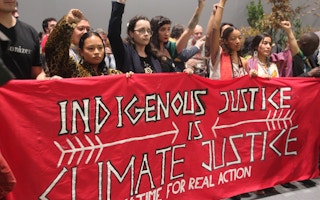The 2022 Fridays for Future (FFF) International Meeting held in Turin, Italy, ended today with a climate strike. Among the demands for urgent climate action from young Indigenous leaders are calls for greater inclusion of Indigenous peoples and local communities (IPLCs) in climate solutions.
Climate activist Greta Thunberg attended the meeting remotely, but said that she did not take centre stage at the strike to allow the voices of young people living in developing countries to be heard.
The Global FFF strike comes in the midst of a heatwave and wildfires that swept across Europe last week.
Young Indigenous leaders who lead youth movements in Indonesia and Mexico joined over 500 climate activists to participate in the latest strike, taking the opportunity to highlight the role IPLCs play in protecting the environment and achieving climate goals.
“We shout on behalf of our peoples so that our land tenure rights are respected, so that traditional knowledge is respected and recognised as a solution to combat climate change and the loss of biodiversity,” said Nansedalia Ramirez Domínguez, a member of the Mexican Network of Peasant and Forest Organisations.
A report released earlier this year by the Forest Declaration Assessment says that fulfilling the Paris Agreement won’t be possible without acknowledging and supporting the crucial role of Indigenous peoples and local communities’ (IPLCs) protected lands.
“
Many innocent Indigenous peoples have been murdered and forced out of their territories for simply protecting their home and refusing to give up their territories to extractive industries.
Michelin Sallata, communications liaison, Global Alliance of Territorial Communities
FFF, is a youth-led and organised global climate protest movement that started in August 2018, when 15-year-old Greta Thunberg began a school strike for climate action outside the Swedish parliament. The hashtag #FridaysForFuture, was later created and youth from over 750 cities joined. They now organise smaller local strikes throughout the year. Among their demands is to keep the global temperature rise below 1.5 degrees Celsius, as recommended by the Paris Agreement.
In Italy, the Indigenous protesters highlighted the rising wave of violence against Indigenous and local communities around the world when they defend their traditional territories. They cited cases of criminalisation, human rights violations, and land grabbing, as national governments prioritise development and conservation projects that are forcing peoples off their ancestral lands.
On July 14, the Association for Tropical Biology and Conservation, a scientific society with more than 900 members in 67 countries, demanded urgent action to stop attacks against Indigenous peoples, environmentalists and communities across the Amazon region in a July 14 declaration.
According to Global Witness, a London-based NGO, Indigenous people make up a third of the total number of environmental defenders killed across the globe, despite being a total of 4 per cent of the world’s population. The most critical situation is in Colombia, where 117 Indigenous people were reported to have been murdered between 2012 and 2020.
“Climate justice is not only related to climate itself, but also to human rights and justice for Indigenous peoples who are being murdered, threatened, imprisoned, and discriminated while they are protecting the only remaining tropical rainforests that we have in the world,” said Michelin Sallata, a communications liaison for the Global Alliance of Territorial Communities and a member of the Toraya tribe in Indonesia. She told Mongabay that community land tenure and land rights is one of the often-overlooked ways to mitigate climate change.
According to the report by Climate Focus and the World Resources Institute (WRI), about 90 per cent of IPLC lands in Brazil, Colombia, Mexico and Peru are carbon sinks. The carbon sequestered in these territories equates to about 30 per cent of the four countries’ Paris Agreement climate targets for 2030.
While IPLCS manage more than 950 million hectares (2.3 billion acres) of the world’s tropical forests, communities do not have legal rights to more than half of the area. Sallata said this leaves forests vulnerable to destruction that usually occurs at the hands of extractive companies from the global north, such as Europe.
“Many innocent Indigenous peoples have been murdered and forced out of their territories for simply protecting their home and refusing to give up their territories to extractive industries,” stated Sallata.
Because of this, she said, FFF’s meeting and strike in Italy was an opportunity to highlight the part companies from industrially developed countries play in contributing to deforestation, as well as human rights violations.
“We feel that while we are in Europe we should march and voice this problem to target the companies that are headquartered here,” Dominiquez told Mongabay.
Mongabay has published several articles on reports linking European companies to Indigenous rights abuses.
Darragh Conway, lead legal counsel at Climate Focus, told Mongabay in a brief interview that there is no reason why governments or policymakers should not be including IPLCs in climate solutions. He said that there is enough information that they are the most effective stewards of the forest or nature in general.
“It’s a no brainer that they have to get a seat at the table,” he said.
While the Glasgow Declaration on Forests and Land Use from last year’s UN climate conference, which pledges to end deforestation by 2030, directly cited IPLCs as having a key role in forest stewardship, there is concern within Indigenous and local communities that the emerging support for will come to pass.
While leading the climate strike towards its end, the two youth leaders told Mongabay that it is crucial to support young Indigenous and local communities across the globe that are marrying their ancestral knowledge with science and technology to propose solutions to the climate crisis.
This story was published with permission from Mongabay.com.

















